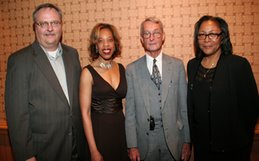Young Democrats
Make a Difference at the Polls!
The following information is provided from YDA.org - If you are an Oklahoma Young Democrat, please check it out and register with YDA.org so we can have more people getting the news from and about YD!
*Young people are giving a 20 point advantage to Democrats when asked who they will vote for in November 2006 (56% will vote for Dems, 36% will vote for Repubs).
*Young people are trending more Democratic for the first time in several years and are more Democratic than the overall electorate. Polls released by Young Voter Strategies show young adults give Democrats a 10 point advantage when asked with which party they identify. Young people are 41% Democrat, 31% Republican and 27% Independent (overall electorate, 38% Democrats, 34% Republican, 27% Independent).
*Young adults in 2006 are far more likely to identify more Democratic than two years ago, when the age group polled about evenly Republican, Democratic, and Independent.
*If someone votes for a Party three times in a row, they are likely to be a Party voter for life, indicating a need for the Democratic Party to invest and focus on young people.
By 2015, Generation Y (born between 1977 and 1994 and will be 18-38 years old then) will make up 30% of the electorate serving as a critical base and indicator of success for Democrats.
*The mere size of Generation X + Y is a critical mass that needs focus. Gen X + Gen Y, 18-35 year olds = 70 million potential voters.
*Contrary to early media reports, the 2004 election cycle marked the highest turnout of young people since 1972.
*Nearly half of all eligible young voters cast ballots in the November 2004 election, raising their turnout rate by more than twice that of any other age group resulting in an increase of 9 percentage points and an increase of 4.3 million voters.
*Over 20.1 million18-29 year olds cast ballots in 2004 (42 million were eligible to vote).
18-30 year olds were the ONLY age group to prefer the Kerry/Edwards ticket (Kerry received 54% and Bush received 44%). This is a significant gain for Democrats. In 2000, Gore only received 47.6% to Bush’s 46.2% of the youth vote.
*Before the November elections, 70% of young people said they received NO contact from a party or candidate. Post-election, this shrunk to below 40% indicating the intense focus on young people by political groups.
*64.4% of young people voted in the 10 most competitive battleground states. Only 48% of young people voted across all other states, proving young voters come out in higher numbers if targeted.
*The vast majority of young people are not in college. In fact only 25-35% of 18-35 year olds are in college. It is critical young voter outreach programs are as diverse as the generation and do not only reside on college campuses.
*Generation Y is politically active and volunteer at record numbers. 83% of college freshmen volunteer and 73% of 18-30 year olds plan on voting in 2006.
*Young people are swimming in debt. Unemployment rates for young people are two to three times higher than that of adults. Additionally, a male in 1972 with a high school degree was earning $42,000 annually and now is only earning $29,000.
*Young people are more likely than any other age group to be uninsured. About one in three young people lack health insurance compared to one in six Americans overall.
*Young people are diverse. 30% of children under 18 are racial or ethnic minorities. Latino young people make up 16% of all young people now (compared to 5% in 1976) and the number of young people who identify as white has decreased to 65% from 88% in 1976.
*Young people like any other demographic wants to listen to their peers and wants to be involved. Unfortunately, there is still a culture in campaigns that young people don’t vote and are too hard to find so we get knocked off voting lists that campaigns use to talk to potential voters. This is often called the “cycle of mutual neglect.”
*We see electoral politics as a vehicle for social change. We do not stop at volunteering in our communities or protesting; we connect our political views with elections and help candidates get elected who share our values.
*It’s not enough for young people to work on general campaigns or volunteer for them. We are doing our generation a disservice by not talking to young people and we are doing our generation a disservice by not demanding the campaigns we work with to target young people.

No comments:
Post a Comment